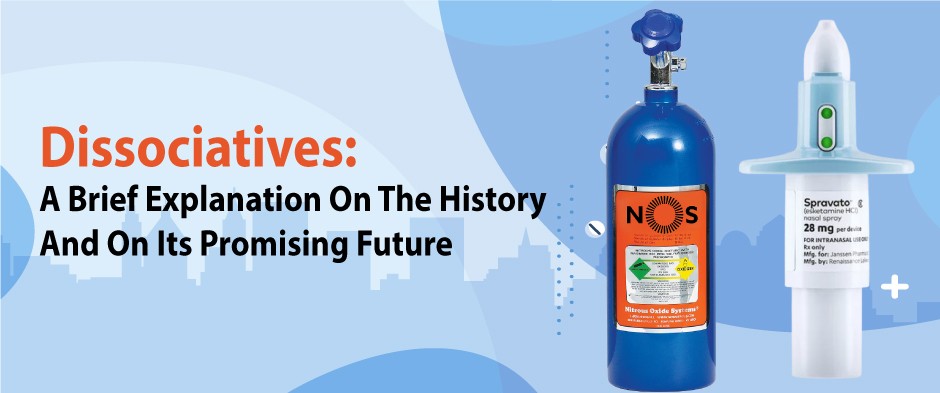free shipping
On All Orders

Dissociatives drugs are a class of drugs that produce an altered state of consciousness and can cause feelings of detachment from reality. They work by disrupting the normal functioning of the brain’s neurotransmitters, causing feelings of numbness, confusion, and disorientation. In some cases, they may also lead to hallucinations, amnesia, and sleep deprivation. To know about this drugs history and the future of it, keep reading further!
Dissociation medication are a type of drug that produce a feeling of detachment from one’s environment and from one’s physical body. They have been used throughout history for various purposes, and their effects are still being studied today. In this blog post, we will explore the history of dissociatives, from early use to medical and recreational applications.
Dissociative drugs have been used in various cultures throughout history for religious, spiritual, and healing purposes. For example, the ancient Greeks and Romans used opium to induce trance-like states for religious rituals. In some Native American tribes, dissociatives were used to help individuals connect with the spirit world. In India, ayahuasca has been used for centuries in healing ceremonies.
Dissociatives have also been used for medical purposes, such as anesthesia. In the early 1800s, nitrous oxide (laughing gas) was first used as an anesthetic during surgery. In the late 1800s, ether and chloroform were used for a variety of medical procedures. Today, dissociatives such as ketamine and phencyclidine (PCP) are still used in some medical settings to induce anesthesia.
The recreational use of dissociatives became popular in the late 1960s and 1970s. At this time, ketamine and PCP became popular recreational drugs. The effects of these drugs have been described as a “mind-altering” state that can produce feelings of detachment, euphoria, and dissociation. Recreational use of dissociative drugs has been linked to physical and psychological harm, and is therefore discouraged.
Overall, the history of dissociatives is complicated and varied. While these drugs can be used for medical and spiritual purposes, their recreational use is highly discouraged due to potential health risks. As more is discovered about the effects of dissociatives, it is important to remain informed and cautious about their use.
The most common types of dissociatives are Ketamine, PCP (Phencyclidine), and DXM (Dextromethorphan). Ketamine is a veterinary anesthetic that is used in some medical settings. It produces a dissociative state in which users feel disconnected from their environment and their bodies. At higher doses, it can cause out-of-body experiences, hallucinations, and a sense of being “out of control”.
PCP, also known as angel dust, is a dissociative anesthetic. It can cause intense feelings of detachment, hallucinations, and mood swings. At higher doses, it can cause delirium and violent behavior. DXM, or dextromethorphan, is an ingredient found in many over-the-counter cough medicines. When taken in large doses, it can cause a dissociative state, hallucinations, and a feeling of detachment from reality.
The use of dissociatives can have both physical and mental/psychological effects on individuals. Dissociatives are a class of psychoactive drugs that produce feelings of detachment, disconnection, and a sense of being away from reality.
Physical Effects
The physical effects of dissociatives can include dizziness, nausea, vomiting, loss of coordination and balance, and an increased heart rate and blood pressure. Dissociatives can also lead to feelings of numbness and tingling in the extremities, as well as blurred vision and a dry mouth. In rare cases, extreme doses of dissociatives can lead to seizures, coma, and even death.
Mental/Psychological Effects
The mental and psychological effects of dissociatives can be profound and long-lasting. Dissociatives can produce feelings of euphoria, an altered sense of time and space, and an altered sense of reality. Dissociatives can also lead to feelings of confusion, anxiety, paranoia, and hallucinations. In extreme cases, dissociatives can cause extreme disorientation, depression, and even psychosis.
b.
In the future, we can expect to see more research and development of dissociative medicine therapies. As more studies are conducted, we will gain a better understanding of how these therapies work and how they can be used to help people with a variety of mental health issues. We can also anticipate an increase in the number of therapists that specialize in dissociative therapies.
As the field of dissociative therapies grows, more and more therapists will become available to offer this type of treatment. The future of dissociative therapies is looking promising. With more research and development, as well as increased access to these services, we can expect to see more people benefitting from these powerful therapies.
You can buy dissociative drugs online at dailycaremedication.com.
On All Orders
Contact us 24 hours a day
Simply return it within 30 days
We ensure secure payment

